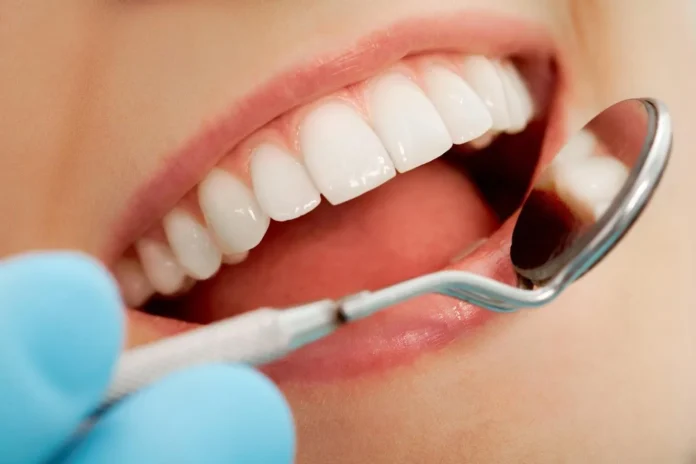19/05/2023
If you have sensitive teeth, you may worry about teeth whitening causing more sensitivity or pain. But there are options available to whiten your teeth safely and effectively without causing discomfort. Let’s explore the causes of tooth sensitivity and discuss how to achieve a brighter smile with teeth whitening for sensitive teeth.
What leads to tooth sensitivity?
To understand tooth sensitivity, let’s examine its common causes:
- Gum recession: When gums recede, the sensitive dentin of the tooth becomes exposed, causing sensitivity to hot and cold temperatures.
- Enamel erosion: The protective outer layer of teeth, called enamel, can erode, revealing the sensitive dentin beneath.
- Tooth decay: Cavities, particularly those near the gum line, can contribute to tooth sensitivity.
- Teeth grinding: The habit of grinding teeth can wear down enamel, resulting in sensitivity.
How to whiten sensitive teeth:

If you have sensitive teeth, there’s no need to worry. There are various options and tips to help you achieve a bright smile. Consider the following:
- Use a toothpaste for sensitive teeth prior to treatment: Look for toothpaste containing ingredients like potassium nitrate or strontium chloride, which can minimize sensitivity. This prepares your teeth for whitening while reducing discomfort.
- Try a low-concentration whitening gel: Many at-home whitening kits have high-concentration gels that can cause sensitivity. Opt for products with 10% or less hydrogen peroxide for a gentler approach.
- Consider professional in-office whitening: For severe sensitivity or quicker results, professional teeth whitening at the dentist’s office may be the best choice. They can use a stronger whitening gel and take precautions to protect your gums and minimize sensitivity.
- Use desensitizing treatments: Before and after teeth whitening, apply a desensitizing gel or fluoride treatment to alleviate sensitivity. This is an effective approach for whitening sensitive teeth.
- Avoid sensitivity-triggering foods and drinks: Certain items like citrus fruits, soda, and coffee can increase tooth sensitivity. Avoid consuming them a few days before and after your whitening treatment.
What about sensitivity after teeth whitening?
Even with the precautions mentioned earlier, some individuals may experience temporary sensitivity, particularly to hot and cold temperatures, following teeth whitening. This occurs because the whitening process temporarily opens the pores in the enamel, allowing the whitening gel to reach deeper layers and break up stains. As a result, the underlying dentin layer may become more exposed and sensitive.
Fortunately, this sensitivity is typically mild and short-lived, usually fading within a few days. To minimize discomfort, avoid consuming hot or cold foods and drinks, use a desensitizing toothpaste, and consider a fluoride treatment to strengthen the enamel. In more severe cases, your dentist may prescribe a stronger desensitizing treatment.
Are there other factors to consider?
Before undergoing any teeth whitening treatment, it is essential to consult with your dentist to ensure its safety and suitability for your specific needs. Along with sensitivity, here are a few additional considerations:
- Existing dental work: Dental work like fillings or crowns will not whiten along with your natural teeth, potentially leading to uneven coloration. Your dentist may recommend replacing or updating the dental work to match your newly whitened teeth.
- Pregnancy and breastfeeding: It is advisable to avoid teeth whitening if you are pregnant or breastfeeding. While there is no conclusive evidence of harm, it is better to be cautious and wait until after giving birth or ceasing breastfeeding.
- Medications: Certain medications, such as antibiotics, can cause tooth discoloration. In such cases, teeth whitening may not be effective. It is crucial to discuss any medications you are taking with your dentist before undergoing an in-office whitening treatment.
Experience professional teeth whitening at SmileBar.
In summary, having sensitive teeth doesn’t mean you have to abandon the idea of achieving a brighter, whiter smile. By taking appropriate precautions and using suitable products, you can whiten your teeth safely without discomfort or pain. Consult your dentist to determine the best approach for your specific needs and ensure a safe and effective whitening treatment or product.
If you prefer professional in-office teeth whitening for your sensitive teeth, book an appointment at SmileBar. With locations in Sydney, Adelaide, Perth, and other cities in Australia, we provide expert teeth whitening services. Our process begins with a consultation to ensure optimal results. We also offer after-care instructions to help maintain your brighter smile for longer.


